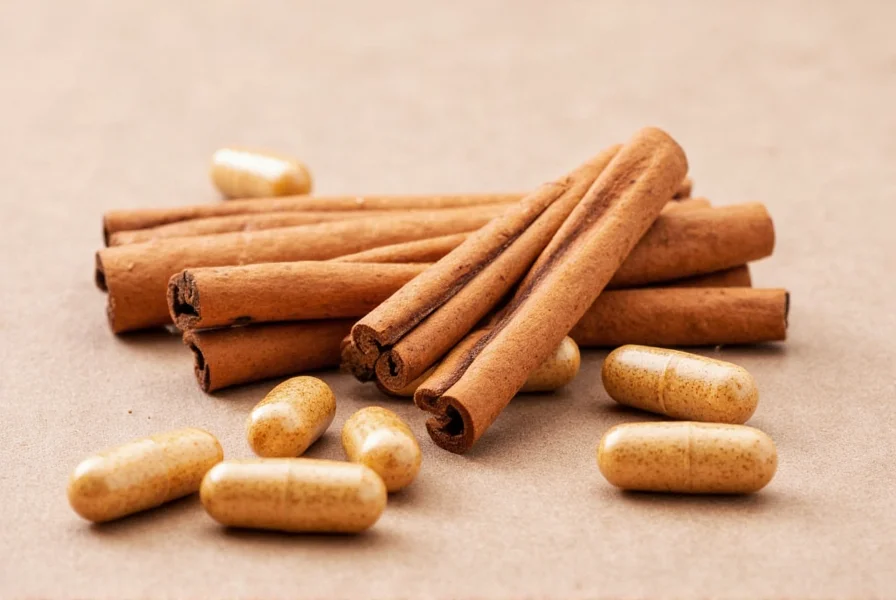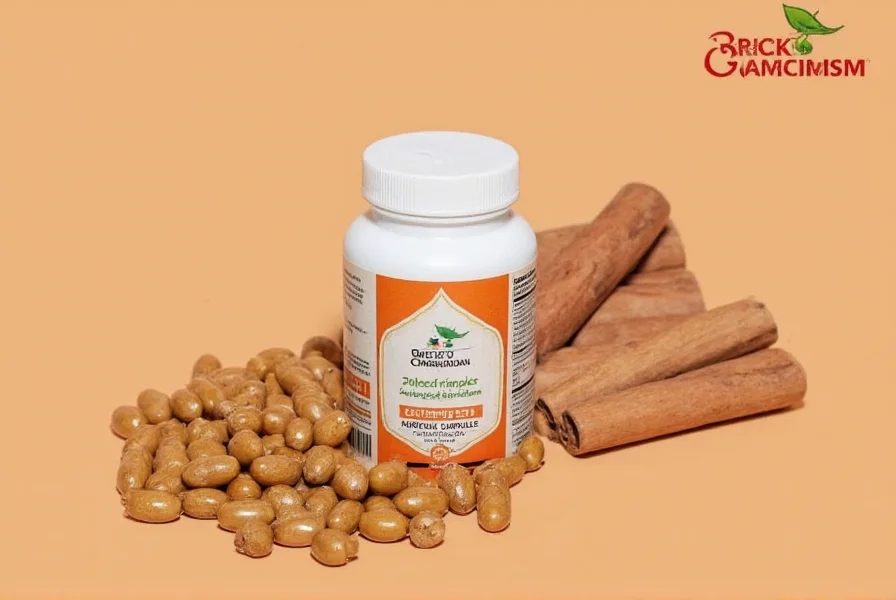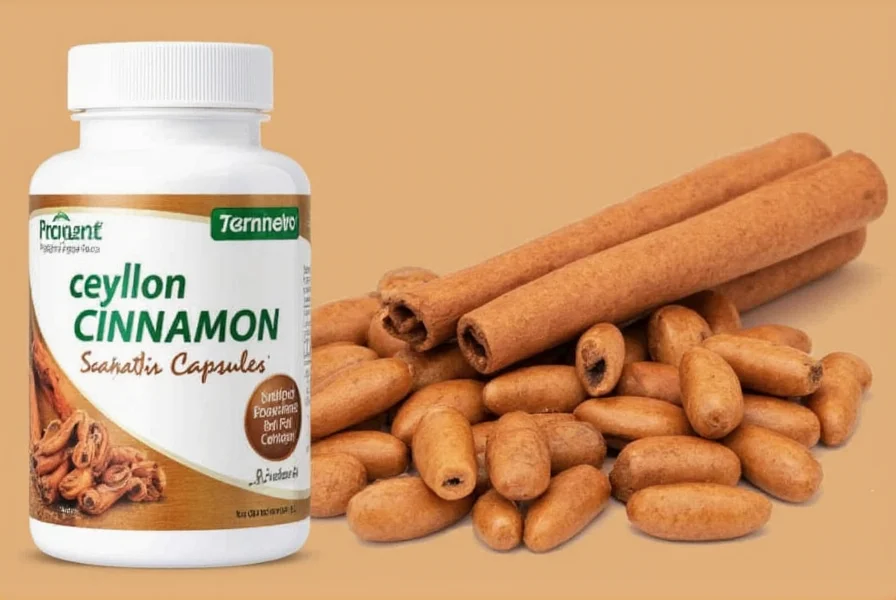Ceylon cinnamon capsules have gained significant attention in the wellness community as a potentially safer alternative to conventional cinnamon supplements. Unlike Cassia cinnamon, which dominates supermarket shelves, authentic Ceylon cinnamon (Cinnamomum verum) contains substantially less coumarin—a compound that can cause liver damage in high doses or with prolonged use. This critical difference makes Ceylon cinnamon capsules particularly relevant for individuals considering regular supplementation.
Understanding Ceylon Cinnamon: The "True" Cinnamon
Native to Sri Lanka and southern India, Ceylon cinnamon has been used for centuries in traditional medicine systems. The distinctive characteristic of Ceylon cinnamon versus Cassia cinnamon lies in its delicate, multi-layered bark structure that forms tight, paper-thin scrolls. This "true" cinnamon variety contains only 0.017% coumarin by weight, compared to Cassia's 1-5%—a difference of up to 250 times more coumarin in the latter.

Evidence-Based Health Considerations
Current research on ceylon cinnamon capsules for blood sugar management shows promising but preliminary results. A 2020 meta-analysis published in Nutrition Journal indicated that cinnamon supplementation (primarily Cassia in most studies) demonstrated modest improvements in fasting glucose levels, though researchers noted significant variability between studies. The lower coumarin content in Ceylon varieties makes them potentially more suitable for extended use when monitoring metabolic health.
Antioxidant properties represent another area of scientific interest. Ceylon cinnamon contains polyphenols that may help combat oxidative stress, though human studies specifically examining Ceylon cinnamon capsules remain limited. Research published in Molecular Nutrition & Food Research identified multiple bioactive compounds in Ceylon cinnamon with potential anti-inflammatory effects, though clinical applications require further investigation.
| Characteristic | Ceylon Cinnamon | Cassia Cinnamon |
|---|---|---|
| Scientific Name | Cinnamomum verum | Cinnamomum cassia |
| Coumarin Content | 0.017% (very low) | 1-5% (high) |
| Bark Structure | Multiple thin layers | Thick, hard single layer |
| Flavor Profile | Milder, sweeter | Stronger, more pungent |
| Recommended Daily Limit | No established limit | Under 1 teaspoon (2-4g) |
Safety Profile and Usage Guidelines
When considering is ceylon cinnamon safe long term, current evidence suggests it presents minimal risk when consumed within typical supplemental ranges. The European Food Safety Authority established a tolerable daily intake of 0.1 mg coumarin per kilogram of body weight. Given Ceylon cinnamon's negligible coumarin levels, most adults could safely consume several grams daily without concern—though specific ceylon cinnamon supplement dosage recommendations typically range from 500-2000 mg daily.
Certain populations should exercise caution with any cinnamon supplementation. Individuals taking blood thinners like warfarin should consult their physicians due to potential interactions, though Ceylon's lower coumarin content reduces this risk compared to Cassia. Those with liver conditions should also discuss supplementation with healthcare providers, despite Ceylon's superior safety profile.

Selecting Quality Ceylon Cinnamon Products
When evaluating how to choose quality ceylon cinnamon capsules, look for third-party verification seals from organizations like USP, NSF, or ConsumerLab. These indicate the product has undergone independent testing for purity, potency, and absence of contaminants. Reputable manufacturers will specify Cinnamomum verum or Cinnamomum zeylanicum on labels rather than generic "cinnamon."
Transparency about sourcing matters significantly. Premium Ceylon cinnamon typically originates from Sri Lanka (formerly Ceylon, hence the name), though some comes from Madagascar or Brazil. Avoid products that don't disclose their cinnamon variety, as many "cinnamon" supplements actually contain Cassia. The price point often reflects authenticity—genuine Ceylon cinnamon commands a higher price due to more labor-intensive harvesting methods.
Realistic Expectations for Supplement Use
While research on ceylon cinnamon for diabetes management shows potential, current evidence doesn't support replacing prescribed medications with cinnamon supplements. Most clinical trials demonstrating blood sugar effects used relatively high doses (1-6 grams daily) of cinnamon, and results have been inconsistent across studies. The American Diabetes Association doesn't currently recommend cinnamon as a standard treatment for diabetes.
For those incorporating ceylon cinnamon capsules into their wellness routine, consistency matters more than high dosing. Many experts suggest starting with lower doses (500 mg daily) to assess tolerance before potentially increasing. Taking capsules with meals may enhance absorption of certain compounds while reducing potential gastrointestinal discomfort.
Consultation with Healthcare Professionals
Before adding ceylon cinnamon capsules side effects should be discussed with a healthcare provider, particularly for individuals with existing health conditions or those taking medications. While generally recognized as safe, cinnamon can interact with certain medications including diabetes drugs, blood thinners, and liver-metabolized compounds. Pregnant or breastfeeding women should consult their obstetrician before using cinnamon supplements regularly.
Frequently Asked Questions
What's the maximum safe daily amount of Ceylon cinnamon capsules?
Based on current research, adults can typically consume up to 2,000-3,000 mg of Ceylon cinnamon daily without safety concerns due to its minimal coumarin content. However, most supplement manufacturers recommend 500-2,000 mg daily. Always follow product-specific instructions and consult your healthcare provider for personalized guidance, especially if you have liver conditions or take medications.
How does Ceylon cinnamon compare to Cassia for blood sugar management?
Both varieties show similar potential benefits for blood sugar regulation in research studies, as the active compounds responsible for these effects (like cinnamaldehyde) exist in both types. The key difference lies in safety for regular use—Ceylon's negligible coumarin content makes it preferable for ongoing supplementation, while Cassia's high coumarin levels limit its safe daily intake. Most clinical trials haven't distinguished between types, so the blood sugar benefits appear comparable when equivalent amounts of active compounds are consumed.
Can I take Ceylon cinnamon capsules with my diabetes medication?
Possibly, but only under medical supervision. Ceylon cinnamon may enhance the effects of diabetes medications like metformin or insulin, potentially causing blood sugar to drop too low. Your healthcare provider can monitor your response and adjust medication doses if needed. Never replace prescribed diabetes treatments with cinnamon supplements—use them only as a complementary approach with professional guidance.
How long does it take to see benefits from Ceylon cinnamon capsules?
Research suggests it may take 4-12 weeks of consistent daily use to observe potential metabolic benefits from Ceylon cinnamon supplementation. A 2013 study in the Journal of the Academy of Nutrition and Dietetics found significant improvements in fasting glucose after 12 weeks of cinnamon supplementation (1-6 grams daily). Individual responses vary considerably based on dosage, overall health status, and other lifestyle factors. Manage expectations—cinnamon supplements typically produce modest effects rather than dramatic changes.
Are there any drug interactions I should know about with Ceylon cinnamon?
Yes, Ceylon cinnamon may interact with certain medications despite its lower coumarin content. Potential interactions include diabetes medications (risk of hypoglycemia), blood thinners (though less concern than with Cassia), and medications metabolized by the liver (CYP450 enzyme interactions). It may also enhance the effects of herbs and supplements that lower blood sugar. Always disclose all supplements to your healthcare provider, especially if you take prescription medications for chronic conditions.











 浙公网安备
33010002000092号
浙公网安备
33010002000092号 浙B2-20120091-4
浙B2-20120091-4